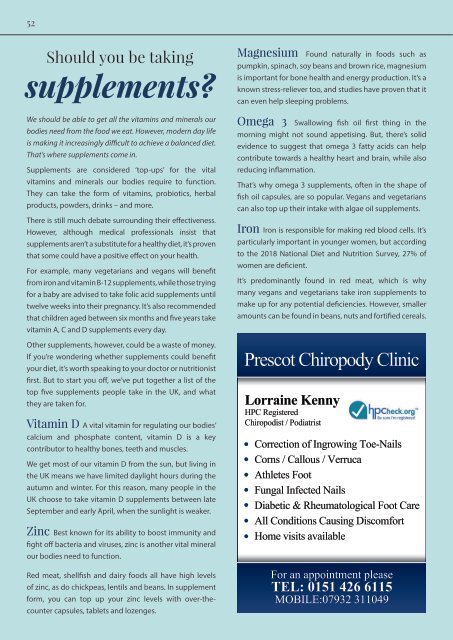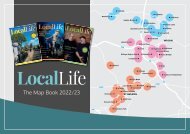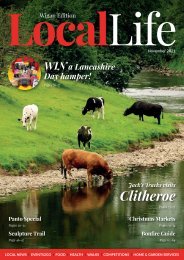Create successful ePaper yourself
Turn your PDF publications into a flip-book with our unique Google optimized e-Paper software.
52<br />
Should you be taking<br />
supplements?<br />
We should be able to get all the vitamins and minerals our<br />
bodies need from the food we eat. However, modern day life<br />
is making it increasingly difficult to achieve a balanced diet.<br />
That’s where supplements come in.<br />
Supplements are considered ‘top-ups’ for the vital<br />
vitamins and minerals our bodies require to function.<br />
They can take the form of vitamins, probiotics, herbal<br />
products, powders, drinks – and more.<br />
There is still much debate surrounding their effectiveness.<br />
However, although medical professionals insist that<br />
supplements aren’t a substitute for a healthy diet, it’s proven<br />
that some could have a positive effect on your health.<br />
For example, many vegetarians and vegans will benefit<br />
from iron and vitamin B-12 supplements, while those trying<br />
for a baby are advised to take folic acid supplements until<br />
twelve weeks into their pregnancy. It’s also recommended<br />
that children aged between six months and five years take<br />
vitamin A, C and D supplements every day.<br />
Other supplements, however, could be a waste of money.<br />
If you’re wondering whether supplements could benefit<br />
your diet, it’s worth speaking to your doctor or nutritionist<br />
first. But to start you off, we’ve put together a list of the<br />
top five supplements people take in the UK, and what<br />
they are taken for.<br />
Magnesium Found naturally in foods such as<br />
pumpkin, spinach, soy beans and brown rice, magnesium<br />
is important for bone health and energy production. It’s a<br />
known stress-reliever too, and studies have proven that it<br />
can even help sleeping problems.<br />
Omega 3 Swallowing fish oil first thing in the<br />
morning might not sound appetising. But, there’s solid<br />
evidence to suggest that omega 3 fatty acids can help<br />
contribute towards a healthy heart and brain, while also<br />
reducing inflammation.<br />
That’s why omega 3 supplements, often in the shape of<br />
fish oil capsules, are so popular. Vegans and vegetarians<br />
can also top up their intake with algae oil supplements.<br />
Iron Iron is responsible for making red blood cells. It’s<br />
particularly important in younger women, but according<br />
to the 2018 National Diet and Nutrition Survey, 27% of<br />
women are deficient.<br />
It’s predominantly found in red meat, which is why<br />
many vegans and vegetarians take iron supplements to<br />
make up for any potential deficiencies. However, smaller<br />
amounts can be found in beans, nuts and fortified cereals.<br />
Prescot Chiropody Clinic<br />
Vitamin D A vital vitamin for regulating our bodies’<br />
calcium and phosphate content, vitamin D is a key<br />
contributor to healthy bones, teeth and muscles.<br />
We get most of our vitamin D from the sun, but living in<br />
the UK means we have limited daylight hours during the<br />
autumn and winter. For this reason, many people in the<br />
UK choose to take vitamin D supplements between late<br />
September and early April, when the sunlight is weaker.<br />
Zinc Best known for its ability to boost immunity and<br />
fight off bacteria and viruses, zinc is another vital mineral<br />
our bodies need to function.<br />
Red meat, shellfish and dairy foods all have high levels<br />
of zinc, as do chickpeas, lentils and beans. In supplement<br />
form, you can top up your zinc levels with over-thecounter<br />
capsules, tablets and lozenges.


















